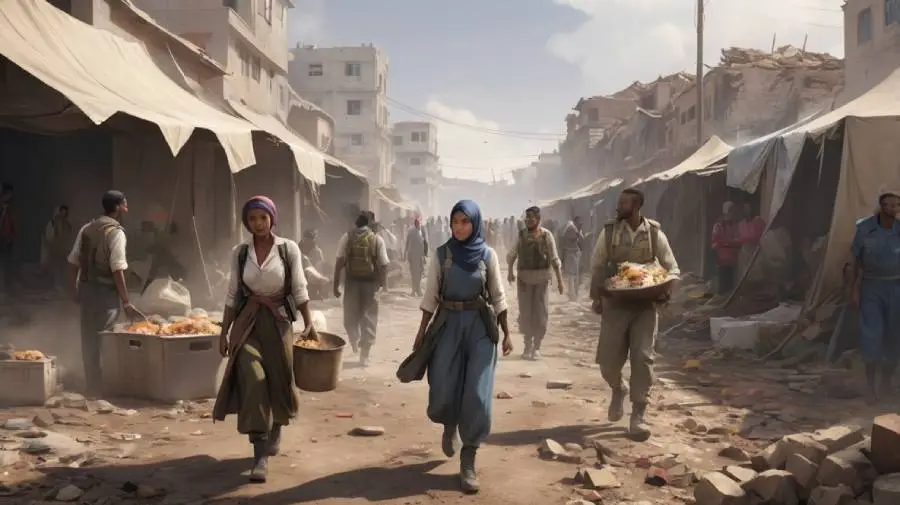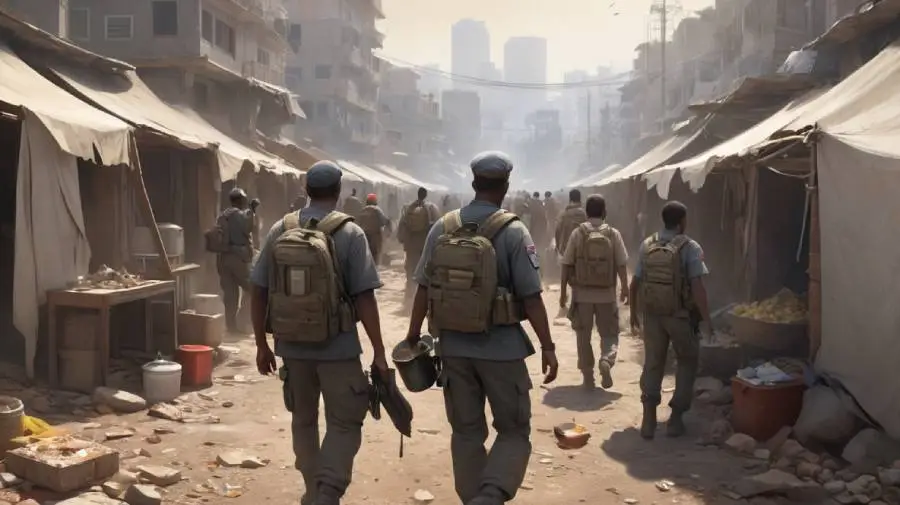World Humanitarian Day: A Tribute to Global Heroes
World Humanitarian Day (WHD) is a day that calls attention to the brave and selfless efforts of humanitarian workers around the globe. Each year, on August 19th, we come together to honor those who dedicate their lives to improving the well-being of others in some of the world’s most challenging environments. This article dives deep into the significance of World Humanitarian Day, its history, and why it is crucial for us to recognize and celebrate the efforts of humanitarian workers.

- Tuesday, 19 August 2025
- Wednesday, 19 August 2026
- Thursday, 19 August 2027
- Saturday, 19 August 2028
What is World Humanitarian Day?
World Humanitarian Day is an international day established by the United Nations (UN) to honor the memory of humanitarian aid workers who lost their lives in the line of duty. It is also a day to raise awareness of the importance of humanitarian aid and the role it plays in alleviating human suffering across the world.
Why Is World Humanitarian Day Important?
The importance of World Humanitarian Day cannot be overstated. In a world where conflicts, natural disasters, and economic inequalities continue to cause immense suffering, humanitarian workers provide essential support to those in need. Their work saves lives, promotes human dignity, and provides hope for millions of people who otherwise might not survive.

The History of World Humanitarian Day
World Humanitarian Day was established in memory of the 22 humanitarian workers who were killed in a bombing in Baghdad, Iraq, in 2003. The tragic incident took place at the United Nations Headquarters in Baghdad, and it led to the creation of this day to honor their sacrifice. Since then, World Humanitarian Day has been celebrated annually, drawing attention to the ongoing challenges faced by humanitarian workers worldwide.
Key Events Leading to World Humanitarian Day
- 2003 Baghdad Bombing: The bombing that killed 22 humanitarian aid workers, including Sergio Vieira de Mello, a UN diplomat, is the defining moment behind the establishment of World Humanitarian Day.
- UN Resolution: In 2008, the United Nations General Assembly declared August 19th as World Humanitarian Day, creating a dedicated platform to highlight the importance of humanitarian work.
- Global Recognition: Over the years, WHD has gained recognition globally, with numerous organizations and governments using this day to raise awareness and advocate for humanitarian causes.
How Do People Celebrate World Humanitarian Day?
World Humanitarian Day is celebrated in various ways around the globe. Governments, non-governmental organizations (NGOs), and individuals participate in activities that highlight the importance of humanitarian work. Here are some common ways people observe the day:
1. Social Media Campaigns
Organizations and individuals use social media platforms to share stories, photos, and videos of humanitarian workers’ efforts. The #WorldHumanitarianDay hashtag is often used to unite people in spreading awareness.
2. Memorial Services
Memorial services are held in honor of those who have lost their lives while providing humanitarian assistance. These services may include moments of silence, speeches, and reflections on the impact of their work.
3. Educational Programs
Many schools and universities use this day as an opportunity to educate students about global humanitarian issues. Educational workshops, seminars, and lectures are conducted to inform the younger generation about the challenges faced by humanitarian workers.
4. Fundraising and Donations
Charitable organizations and NGOs often hold fundraising campaigns or events on World Humanitarian Day to collect donations for humanitarian aid projects. This helps fund life-saving initiatives in conflict zones and areas affected by natural disasters.
The Role of Humanitarian Workers
Humanitarian workers play a pivotal role in delivering aid to people affected by crises, be it through providing medical care, food, shelter, or education. Their work often places them in dangerous and unstable environments, yet they continue to provide essential services to save lives and help rebuild communities.
Types of Humanitarian Work
- Medical Aid: Humanitarian workers often provide emergency medical care to people in crisis zones. This includes treating injuries, preventing the spread of diseases, and offering mental health support.
- Food Distribution: In regions suffering from famine or economic collapse, humanitarian organizations distribute food to vulnerable populations.
- Shelter and Protection: In areas affected by war or natural disasters, aid workers help rebuild homes and provide temporary shelters.
- Advocacy: Some humanitarian workers focus on raising awareness and advocating for the rights of marginalized groups, including refugees, women, and children.
Challenges Faced by Humanitarian Workers
Humanitarian workers face numerous challenges, both physical and emotional, in their line of duty. Some of the most pressing challenges include:
1. Conflict Zones
Operating in conflict zones presents a range of dangers, from being caught in crossfire to facing intentional attacks. Humanitarian workers are often targeted by extremist groups or hostile governments.
2. Limited Resources
Despite the best efforts of humanitarian organizations, resources such as food, medicine, and shelter are often scarce in disaster zones. Humanitarian workers must make difficult decisions on how to allocate these limited resources to those who need them most.
3. Emotional Toll
Witnessing immense human suffering can take a significant emotional toll on humanitarian workers. The trauma of seeing people in pain, losing lives, and enduring violence can lead to burnout and mental health struggles.
4. Political Barriers
In some regions, political barriers and government restrictions can hinder the work of humanitarian organizations. Aid workers may be denied access to certain areas, or their work may be manipulated for political gain.
The Impact of Humanitarian Aid on Global Development
Humanitarian aid not only provides immediate relief but also contributes to long-term development. By providing education, medical care, and infrastructure, humanitarian workers lay the foundation for rebuilding societies after a crisis.
Key Areas of Impact
- Health: Humanitarian aid helps combat diseases, reduce malnutrition, and improve overall public health.
- Education: Access to education in crisis situations is essential for the future of children in conflict areas.
- Economic Recovery: Aid efforts can help stimulate local economies by providing jobs and rebuilding infrastructure.
- Peace and Stability: Humanitarian workers often play a key role in fostering peace and stability in post-conflict regions.
How You Can Contribute to Humanitarian Causes
While World Humanitarian Day is a time to recognize the efforts of aid workers, it is also an opportunity for individuals to contribute to humanitarian causes. Here are a few ways you can get involved:
1. Volunteer
Consider volunteering with local organizations or international NGOs that focus on humanitarian aid. Your skills, whether in healthcare, education, or logistics, can make a difference.
2. Donate
Financial contributions to reputable organizations can help fund life-saving projects. Donating goods like food, clothing, and medical supplies is another way to support humanitarian causes.
3. Raise Awareness
Use your voice to raise awareness about global humanitarian issues. Social media is a powerful tool to share information, stories, and resources related to humanitarian aid.
Conclusion
World Humanitarian Day is a day to reflect on the selfless acts of those who work tirelessly to alleviate human suffering. It serves as a reminder that the global community must come together to support those in need and honor the dedication of humanitarian workers. Let us take this opportunity to not only celebrate their efforts but also to contribute in any way we can to help those who need it most.
Frequently Asked Questions (FAQs)
1. When is World Humanitarian Day celebrated?
World Humanitarian Day is observed every year on August 19th.
2. Why was World Humanitarian Day created?
It was created in memory of the humanitarian workers who lost their lives in the 2003 Baghdad bombing, highlighting the risks humanitarian workers face daily.
3. Who can be a humanitarian worker?
Anyone can become a humanitarian worker, as long as they are committed to helping those in need. Many humanitarian workers come from diverse backgrounds, including healthcare, education, logistics, and engineering.
4. How can I support World Humanitarian Day?
You can support WHD by donating to humanitarian organizations, volunteering your time, or spreading awareness through social media.
5. What is the theme for World Humanitarian Day 2024?
The theme for each year varies, focusing on different aspects of humanitarian work, such as gender equality, protecting the environment, or conflict resolution.


